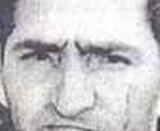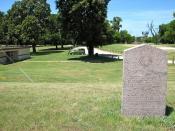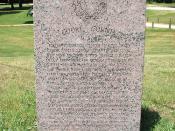This first chapter of Part Two of Robert Drewe's memoir, 'The Shark Net', portrays the significant role of the Dunlop Company within the Drewe household. Titled 'Blackboys', Drewe illustrates Dunlop's power 'to separate you from your family.' This is symbolic of their transfer to Western Australia, and Drewe's mother forcefully having to leave her family in Melbourne. He describes the company's controlling influence: 'It could send you all...twelve hours and two thousand miles west.'
Drewe's questioning of his mother about Perth, "Is there gas in Perth? Is this Africa?" denotes the sub-text - is Perth dangerous and are we alone? While staying overnight at the Chutes', Drewe is warned of the Aboriginal people: 'Sleep tight sonny. There's a lot of blackboys out there in the garden.' Filled with anxiety, Drewe uses auditory imagery to depict his conscious awareness of the 'black boys': 'It was too dark to see them but I could hear their whispers and the soft rattle of their spears.'
Overhearing his father and Mr Chutes discussing the future of Dunlop rubber products, Drewe felt comforted and somewhat unphased by his surroundings. This conversation comforts him: 'everyone chuckled, and I fell asleep.' The chapter concludes with an underlying sense of benevolence, indicating that any tension previously expressed has been resolved.
Titled "People of the Dunes", the following section details the first years of the Drewe's in Perth. The title suggests a relaxed and informal tone, exemplifying the residents of Perth as leisurely, coastal people. This notion is further enhanced by Drewe, using evocative visual imagery to illustrate Perth's inhabitants, describing them as 'Sand People.' Their appearance rearranged by the sun and wind -- they are 'tanned, freckled, scabbed and bleached.' The young narrator distinguishes them as a different species: 'They look nothing like Melbourne people.' Drewe uses...


